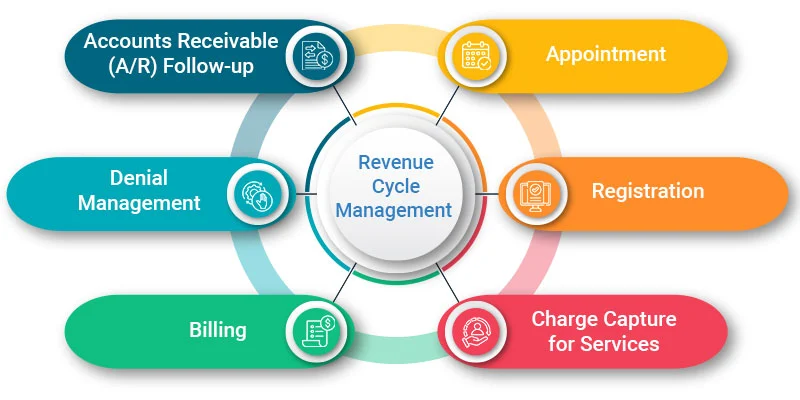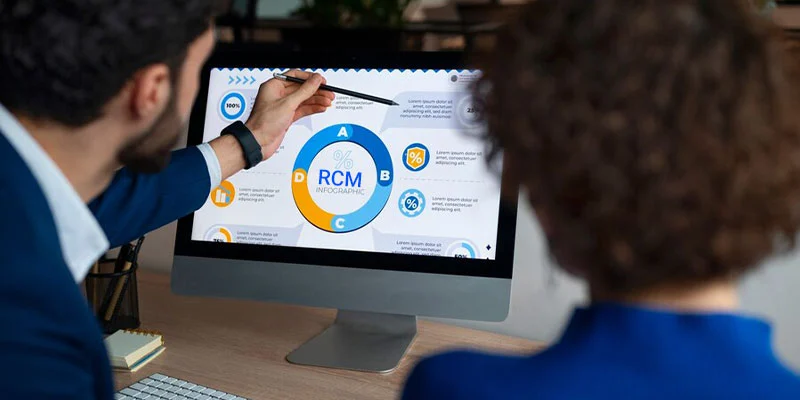Healthcare Revenue Cycle Management (RCM) is the financial method used for handling the administrative and clinical procedures associated with claims processing, billing payment, and revenue generation. The Revenue Cycle Management solutions consists of identifying, managing, and collecting patient service revenue. The RCM process is crucial to providing healthcare organizations with a stay-in procedure for treating patients. Revenue Cycle Management solutions also collect profits and subsequently keep up with expenses. Effective Healthcare Revenue Cycle Management helps healthcare organizations comply with regulatory needs and enhances patient satisfaction. A pack of factors go into handling a successful Revenue Cycle in healthcare. One of the most important is RCM Services. With Revenue Cycle Management Services, healthcare organizations provide proper and quick reimbursement for their medical services. While this is undoubtedly beneficial to healthcare providers, it’s also helpful to the patient.
What is Healthcare Revenue Cycle Management?

In healthcare Revenue Cycle Management, all the administrative functions contribute to the capture, management, and collection of patient service revenue. The following activities are involved in the Revenue Cycle in healthcare: charge capture, coding, patient collections, claim submission, registration, remittance processing, claim follow-up and utilization review.
Basics Steps to Involved in Effective Revenue Cycle Management Services

Benefits of Healthcare Revenue Cycle Management (RCM) and RCM Systems
- RCM Systems shut the gap between the patient and healthcare account sides. For example, the RCM process links demographic data (patient’s name, insurance details, and other personal information) with the healthcare treatment a patient receives.
- A well-designed RCM system simplifies the billing and collection Revenue Cycle Management Services cycles by accurately preregistering, creating appointments for, and scheduling patients; collecting current balances; processing payments; and examining insurers when they reject claims.
- The healthcare organization team (including managers, providers, and specialists in billing, medical coding, and preauthorization) shares calculation systems and Electronic Health Records (EHRs). Using EHRs becomes more accessible with the help of RCM process software or systems. This RCM System streamlines the reversal time associated with offering a service and accepting payment for it, along with lowering administrative overhead costs.
- RCM systems permit the healthcare teams to enter all the required information for claim processing, which helps control the need to change or resubmit claims. Declining denied claims protects healthcare providers’ time and money.
- Healthcare Revenue Cycle Management enhances the patient care procedure, giving a better understanding of patients. For example, patients will understand any bill balance or upcoming financial expectations from the beginning through insurance eligibility validation.
- The Revenue Cycle in healthcare’s accurate billing and coding, and understanding the cause for denials, help improve the patient experience through proper charging, which directs to fewer denials. This RCM process accuracy minimizes stress for the patient and healthcare provider.
- RCM systems allow patients to settle their bills online, and healthcare providers can utilize RCM systems to maintain and manage patients’ billing records.
- Healthcare Revenue Cycle Management depends on documentation to help the medical needs behind the charge. Patient safety is enhanced because the proper documentation leads to a more promising overall quality of care for the patient. Many healthcare providers review the patient’s chart to provide clear documentation, which gives a better overall picture of the patient’s issue.
- RCM systems streamline reporting and analyzing data where required to verify that the Revenue Cycle in healthcare is working and performing satisfactorily within the organization.
What To Look for When Selecting a Revenue Cycle Management System?

Why Should Healthcare Facilities use RCM Software Solutions?

- Reducing calls and hold times.
- Normalizing eligibility and prior approval via online payer systems to eliminate most eligibility problems with RCM Services aimed at verifying patient plans, increasing accuracy in billing and claims, improving follow-up, and effectively settling potential denials.
- Maintaining the revenue team updated on payer guidelines and their respective billing and reimbursement measures.
- Providing staff training and updates about government rules that may present challenges for practices and others facing financial issues.
- Collecting patient charges using online patient portal systems to reduce phone calls and the need to develop multiple statements, assist with posting payments, and minimize reversal time for payments.





